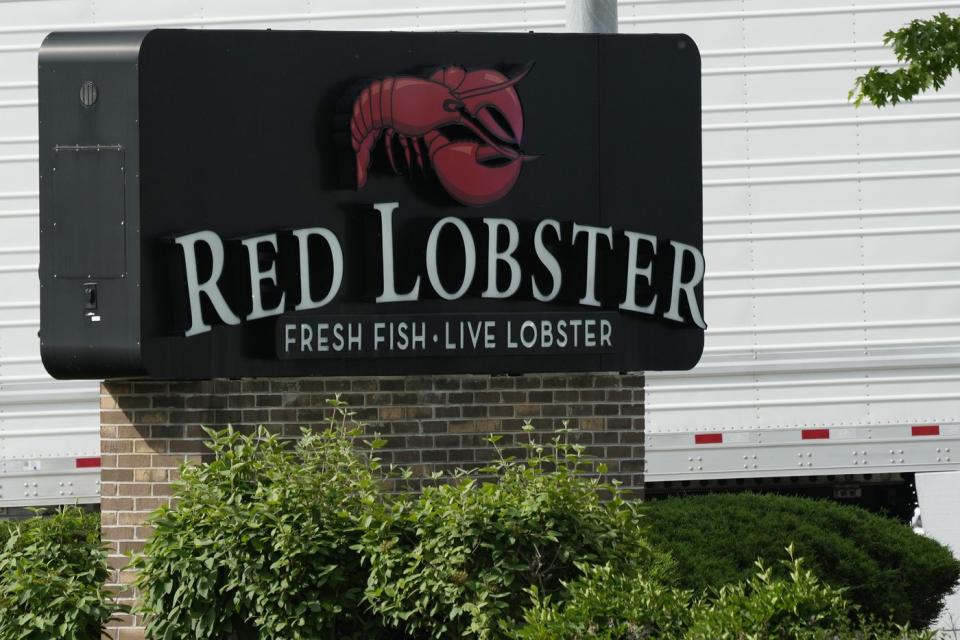Ontario judge upholds Red Lobster's U.S. bankruptcy case in Canada

TORONTO — An Ontario judge issued an order Tuesday that recognizes and enforces Red Lobster’s U.S. bankruptcy protection proceedings in Canada.
The order from Judge Michael Penny was requested by lawyers for the beleaguered seafood restaurant chain's Canadian business, who told a virtual court their client is working to steady its operations.
"Everything we are trying to do today is to stabilize the business," said Linc Rogers, a lawyer representing Red Lobster Canada, Inc.
The future of the chain, best known for its expansive seafood offerings, Cheddar Bay biscuits and family-friendly atmosphere, was thrown into question earlier this month, when its Florida-based parent company filed for Chapter 11 bankruptcy in the U.S. and shuttered dozens of restaurants.
Penny granted Red Lobster Canada a stay that prevents creditors from taking action against it, last week. His Tuesday order to recognize the U.S. proceedings will hand the company more breathing room as the case south of the border winds through court and the chain contemplates its future.
That future could involve selling off some or all of the company's Canadian assets, a May 20 affidavit from the chief executive of Red Lobster Management LLC shows.
"With a looming liquidity crisis and no meaningful ability to raise fresh capital, the RL Group’s board of directors ... determined that a value-maximizing sale would be the best possible alternative," the filing from Jonathan Tibus says.
Red Lobster, which expanded to Canada in 1983, has 2,000 Canadian employees, who are mostly part time and non-unionized. The chain has 27 locations across Ontario, Alberta, Manitoba and Saskatchewan.
The company leases most of its properties in the country and owns two in Ontario, including a Brantford restaurant site and an Etobicoke location on The Queensway, where it owns a building but not the land.
Stuart Brotman, a lawyer representing information officer FTI Consulting, told the court Tuesday that Red Lobster Canada "has been and is expected to continue to be cash flow positive," but Tibus said in his affidavit that the overall company has faced "significant challenges."
Those challenges include "disruptions to its supply chain, hyperinflation affecting food, labour and delivery costs, substantial increases in the cost of capital and real property leases, and shifts in casual dining trends both during and after the COVID-19 pandemic."
Another filing from the company shows its annual customer count dropped by 30 per cent since 2019 and has only "marginally improved from pandemic levels."
Even its “Ultimate Endless Shrimp” promotion, which was at one time made a permanent offering, hampered the company's financial performance.
Tibus labelled it a "significant cash drain" that filings say cost Red Lobster US$11 million.
The company is now investigating whether its former chief executive Paul Kenny and Thai Union, a seafood conglomerate with a stake in Red Lobster, encouraged marketing of the promotion that was so "excessive" it triggered "major shortages of shrimp with restaurants often going days or weeks without" the seafood.
Thai Union said it has been a supplier to Red Lobster for more than 30 years and it intends for the relationship to continue.
"We are aware of the meritless allegations in the bankruptcy court pleadings and look forward to a full representation of the facts," Thai Union said in a statement.
By June 2023, Tibus said the company had begun working on a plan to reduce spending and waste while restoring growth to the company. Court documents show the plan was meant to "simplify" the menu and "implement a sensible promotional calendar with fewer limited-time offers."
However, Tibus said the brand is still facing "significant liquidity and operational challenges, which were exacerbated and accelerated by significant over-market and underperforming leases and poor operational and marketing decisions by prior management."
Red Lobster did not respond to a request for comment on the filing or the future of its Canadian assets.
The chain was founded in the U.S. in 1968 but has since amassed 551 U.S. restaurants and several in Mexico, Ecuador, Japan and Thailand.
Its court records say it counts more than 64 million customers per year and is responsible for 20 per cent of all North American lobster tails and 16 per cent of all rock lobsters sold worldwide.
It began as a privately owned company but was bought by food manufacturer General Mills, which eventually spun off its restaurant division as a publicly traded company.
General Mills sold the brand in 2014 to Golden Gate Capital, which sold 25 per cent of Red Lobster to Thai Union in 2016 and the remaining portion to the seafood conglomerate in 2020.
This report by The Canadian Press was first published May 28, 2024.
Tara Deschamps, The Canadian Press

 Yahoo Finance
Yahoo Finance 